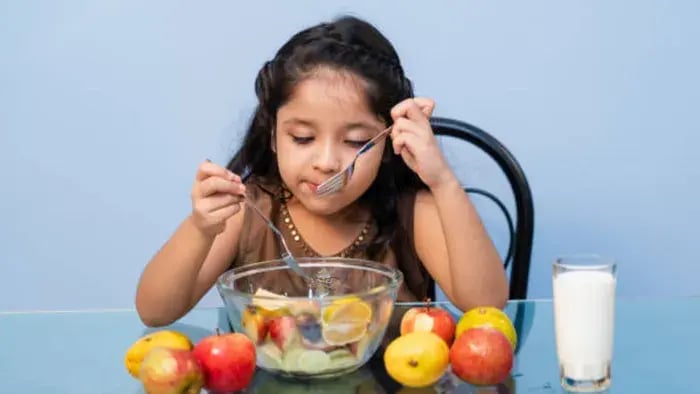- Haldi Doodh (Turmeric Milk)
- Soaked Almonds
- Tulsi Leaves or Tulsi Water
- Homemade Ghee
- Sprouted Moong and Other Pulses
- Seasonal Fruits Like Amla and Guava
- Homemade Chyawanprash
Introduction

Keeping your child healthy goes beyond regular check-ups or last-minute supplements. For many Indian moms, the answer has been right in the kitchen, hidden in daily meals, family traditions and grandma-approved home hacks. And now even nutritionists agree: some of the most powerful immunity boosters are the ones that have been around for ages in Indian households.
Children are naturally curious and active, so they need strong immunity to keep up with their daily adventures, even if it is playing in the mud, eating something off the floor or dealing with seasonal changes. Instead of relying only on pills or processed products, smart eating habits with the right ingredients can make a big difference in building natural resilience.
A spoonful of homemade chyawanprash to the habit of starting the day with soaked almonds or tulsi water, immunity grows with consistency and care. And when that care is paired with expert advice, it becomes even more effective. Indian nutritionists today are reiterating what many mothers already knew: simple, balanced and nutrient-rich foods go a long way in supporting a child’s defense system.
So if you’re looking for reliable and wholesome ways to keep your child healthy and energetic, here are seven immunity boosters every parent should know about, each one loved by Indian moms and recommended by experts.
Strong from the Start: 7 Immune-Boosting Foods

When it comes to building a child’s immunity, Indian homes have always relied on the kitchen first. Moms across generations have turned to everyday foods and age-old practices, often passed down from their own mothers, to keep kids healthy and active. What’s beautiful is that many of these time-tested foods are now backed by nutritionists as well. If you're looking for ways to boost your kid’s immunity without pills or powders, these seven foods offer the perfect place to begin.
Haldi Doodh (Turmeric Milk)
According to a study published in, Front Pharmacol. 2020, turmeric is loaded with curcumin, a natural compound known for its anti-inflammatory and antioxidant properties. When combined with warm milk and a pinch of black pepper, it becomes a comforting and powerful immunity drink. Serve it warm at bedtime, especially during seasonal changes or after a long day. It supports restful sleep, eases sore throats, and helps build long-term resistance to infections.
Soaked Almonds
As per a study published in, Nutrients. 2020, almonds are rich in vitamin E, healthy fats, and plant-based protein. Soaking them overnight softens the skin and makes them easier to digest, especially for kids. Vitamin E supports the immune response and also contributes to skin and eye health. A handful of soaked almonds each morning is a small step with big benefits.
Tulsi Leaves or Tulsi Water
Research conducted by, J Ayurveda Integr Med. 2014, shows that tulsi, known as holy basil, tulsi has antimicrobial, anti-inflammatory, and adaptogenic properties. Indian moms often add a few leaves to water or boil them into herbal tea during monsoon and winter. You can offer kids tulsi-infused water in the morning or mix the extract with honey for added appeal. It helps in fighting off infections and improves respiratory health.
Homemade Ghee
Ghee is more than a cooking fat in Indian homes. Research published in, J Ayurveda Integr Med. 2024, suggests rich in butyric acid and fat-soluble vitamins like A and D, supporting digestion and helping absorb nutrients that strengthen immunity. Whether spread on rotis, drizzled over dal rice, or added to khichdi, ghee supports gut health, which is directly linked to overall immunity in kids.
Sprouted Moong and Other Pulses
Research published in, Int J Food Sci Nutr. 2019, sprouting increases the nutritional value of pulses, making them rich in enzymes, fiber, iron, and protein. Moong sprouts, in particular, are easy to digest and great for school lunch boxes or evening snacks. You can lightly steam them, add lemon, and toss with chopped veggies to create a tasty, immune-supporting salad that’s also fun to eat.
Seasonal Fruits Like Amla and Guava
According to a study published in, J Food Sci Technol. 2015, amla (Indian gooseberry) and guava are packed with vitamin C, one of the key nutrients that boost immunity. Amla juice with honey is a favorite among Indian moms, while guava makes a great snack with a pinch of black salt. Both fruits help build resistance against infections and speed up recovery during illness.
Homemade Chyawanprash
As per a study published in, Biomolecules. 2019, chyawanprash, made from amla and over 40 herbs and spices, is a traditional Ayurvedic formula that boosts immunity, improves digestion, and increases energy. While some kids may need a little coaxing at first, mixing it with warm milk or spreading it on roti can help. Nutritionists say its vitamin C content and adaptogens make it a valuable daily supplement, especially during the school season.
Conclusion

Supporting your child’s immunity doesn’t mean you have to search for imported superfoods or complex recipes. The answers are already present in your kitchen and culture. These simple, wholesome foods, endorsed by both Indian moms and nutritionists, offer consistent and natural protection against everyday infections. The key lies in routine, patience, and trusting the small habits that build strength from the inside out.
Her love for storytelling began with reading her grandfather’s speeches, where Tarishi saw the power of words in creating lasting memories. Combining her passions for food and writing, she has turned her life into a fulfilling path of sharing stories that celebrate flavours and how food brings communities together.
The views expressed are that of the expert alone.
The information provided in this content is for informational purposes only and should not be considered a substitute for professional medical advice, diagnosis, or treatment. Always seek the advice of your physician or another qualified healthcare provider before making any significant changes to your diet, exercise, or medication routines.
References
https://pmc.ncbi.nlm.nih.gov/articles/PMC6571565/
https://pmc.ncbi.nlm.nih.gov/articles/PMC4648887/
https://pubmed.ncbi.nlm.nih.gov/29848118/
https://pmc.ncbi.nlm.nih.gov/articles/PMC10789628/
















